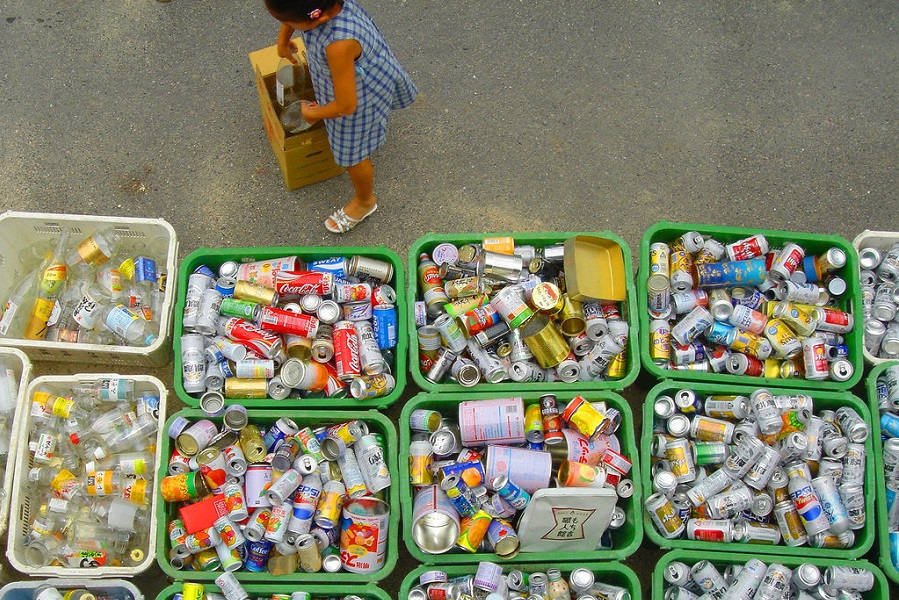Throwback Thursday: From the Archives
Recycling starts young. Photo by Timothy Takemoto
“Reduce, reuse, recycle” is popularly toted as how society can go green. We mindlessly toss the discards of our consumption in a recycling bin, satisfied we are saving the planet.
However, there’s more to it than just throwing an old juice carton in a bin and out pops a new one. The very process of recycling requires additional inputs and resources, at times costing the environment more in the process than is saved by the act of recycling.
In 1996, a debate arose over whether recycling is just a “rite of atonement for the sin of excess.” The National Resources Defense Council (NRDC) responded with an 86-page report on why we need recycling:
A much higher percentage of materials now discarded in the U.S. waste stream can be recycled, and the environment would certainly benefit if many of the products now made from virgin resources were manufactured from recycled resources instead…. The most obvious and well-known advantage of recycling is that it leads to less garbage being buried in landfills, and environmental problems are the major reason more than 10,000 landfills have closed in the United States in the past fifteen years.
…
Far from trashing recycling and impugning the motives of its proponents, all sectors of the polity would do well, materially and spiritually, to embrace and help advance the sustainable, community-building, natural harmony it promotes.
Clark Wiseman, an economist from Gonzaga, took a less apocalyptic view.
The real issue is the appropriate level of recycling…. I will address the main issue, the costs of recycling. All economic costs are due to resource use – ultimately the use of human resources (time, effort, skills, and knowledge) and natural resources. When we say that one management option is more costly than another we are saying that it uses more resources than the other. Recycling is supposed to “save” resources, but when the full range of resources is considered, it may instead waste resources.
…
A study … reported that per-ton recycling costs were less than disposal costs for each of four Washington Programs…. The study compared the cost of recycling a ton of material with the cost of disposing of it in a landfill, but failed to acknowledge that recycling means additional collection by additional trucks. When this is recognized, the conclusion is reversed. In every case studied by the Clean Washington Center, including Seattle’s highly vaunted program, the net recycling cost exceeds the avoided disposal cost by between $15 and $90 per ton.
…
In sum, the NRDC doesn’t have much of a case when it pushes for ever more recycling. Its lack of objectivity may even undermine its credibility with all but the most unquestioning of recycling enthusiasts.
It sounds simple enough – save our limited natural resources by recycling the goods that have already been produced. Mainstream environmentalists continue to advocate for recycling everything from notebook paper to heavy machinery, and it’s easy for the public to be supportive of an approach where consumptive habits are, at least perceived to be, good for the environment. However, as Wiseman points out, there are instances when recycling costs more resources than it saves, and we have to figure out when it is environmentally worth it to recycle.
PERC has long been involved in determining the best level of recycling. Nearly twenty years after the NRDC published their report advocating recycling, we continue to explore the true costs associated with turning old stuff into new stuff. PERC scholars have debunked recycling myths. We’ve found that landfills are not poisoning us or running out of room, operating recycling programs costs a large amount of resources, and the complete recycling process can easily consume more resources than it saves. That’s not to say recycling doesn’t have a time and place, for example it’s worth it to recycle aluminum cans, but we need to be more conscious in determining when recycling actually benefits the environment.
As government policies continue to push for more recycling, we need to remember that more isn’t necessarily better when it comes to recycling. Instead, we should focus on determine when recycling truly conserves resources and how to improve the recycling process so it uses fewer resources. It is then we will determine the optimum level of recycling and dispose of our waste in a way that’s best for the environment.
Selections from the NRDC paper and Wiseman’s response were published as a “Salvation or Dross?” debate in the August 1997 edition:
“Salvation or Dross? Recycling’s Record” by Allen Hershkowitz
“Salvation or Dross? Recycling Revisted” by Clark Wiseman




